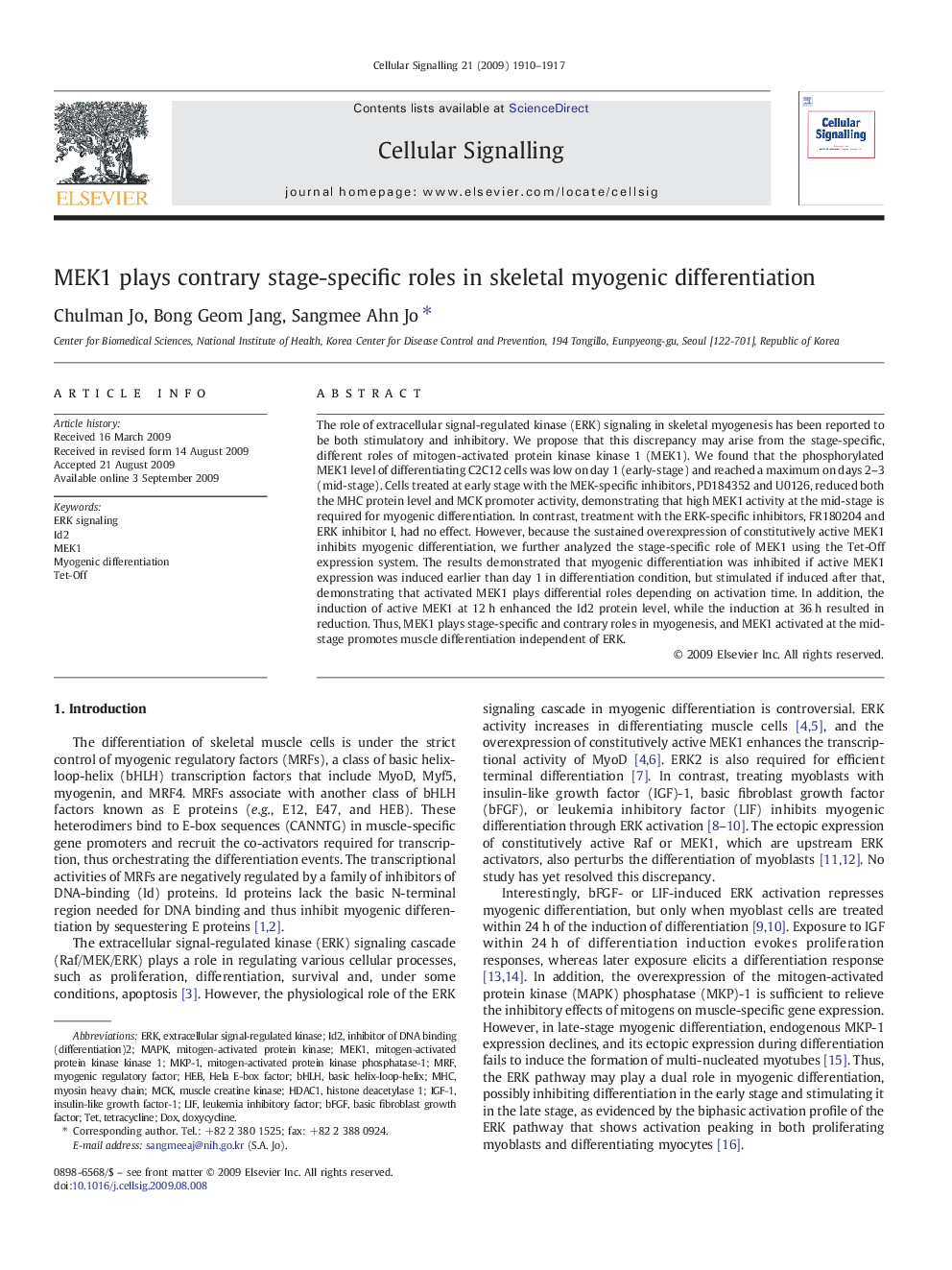| کد مقاله | کد نشریه | سال انتشار | مقاله انگلیسی | نسخه تمام متن |
|---|---|---|---|---|
| 10816875 | 1058608 | 2009 | 8 صفحه PDF | دانلود رایگان |
عنوان انگلیسی مقاله ISI
MEK1 plays contrary stage-specific roles in skeletal myogenic differentiation
دانلود مقاله + سفارش ترجمه
دانلود مقاله ISI انگلیسی
رایگان برای ایرانیان
کلمات کلیدی
MRFHEBLIFMCKMEK1MKP-1Id2HDAC1bHLHIGF-1TETERKDOXbFGFERK signaling - ERK سیگنالینگMAPK - MAPKTet-Off - TET-فعالbasic helix-loop-helix - اسلحه پایه حلقه ایinsulin-like growth factor-1 - انسولین مانند عامل رشد 1Tetracycline - تتراسایکلینMyogenic differentiation - تمایز میوگنdoxycycline - داکسی سایکلینMyosin heavy chain - زنجیره سنگین میوزینMyogenic regulatory factor - عامل تنظیم کننده Myogenicleukemia inhibitory factor - عامل مهارکننده لوکمیmuscle creatine kinase - عضله کراتین کینازbasic fibroblast growth factor - فاکتور رشد فیبروبلاست پایهMHC - مجموعه سازگاری بافتی اصلیhistone deacetylase 1 - هیستون دیازتیلاز 1Mitogen-activated protein kinase phosphatase-1 - پروتئین پروتئین Mitogen-fosinase phosphatase-1mitogen-activated protein kinase kinase 1 - پروتئین کربوکسی سدیم 1mitogen-activated protein kinase - پروتئین کیناز فعال با mitogenextracellular signal-regulated kinase - کیناز تنظیم شده سیگنال خارج سلولی
موضوعات مرتبط
علوم زیستی و بیوفناوری
بیوشیمی، ژنتیک و زیست شناسی مولکولی
زیست شیمی
پیش نمایش صفحه اول مقاله

چکیده انگلیسی
The role of extracellular signal-regulated kinase (ERK) signaling in skeletal myogenesis has been reported to be both stimulatory and inhibitory. We propose that this discrepancy may arise from the stage-specific, different roles of mitogen-activated protein kinase kinase 1 (MEK1). We found that the phosphorylated MEK1 level of differentiating C2C12 cells was low on day 1 (early-stage) and reached a maximum on days 2-3 (mid-stage). Cells treated at early stage with the MEK-specific inhibitors, PD184352 and U0126, reduced both the MHC protein level and MCK promoter activity, demonstrating that high MEK1 activity at the mid-stage is required for myogenic differentiation. In contrast, treatment with the ERK-specific inhibitors, FR180204 and ERK inhibitor I, had no effect. However, because the sustained overexpression of constitutively active MEK1 inhibits myogenic differentiation, we further analyzed the stage-specific role of MEK1 using the Tet-Off expression system. The results demonstrated that myogenic differentiation was inhibited if active MEK1 expression was induced earlier than day 1 in differentiation condition, but stimulated if induced after that, demonstrating that activated MEK1 plays differential roles depending on activation time. In addition, the induction of active MEK1 at 12Â h enhanced the Id2 protein level, while the induction at 36Â h resulted in reduction. Thus, MEK1 plays stage-specific and contrary roles in myogenesis, and MEK1 activated at the mid-stage promotes muscle differentiation independent of ERK.
ناشر
Database: Elsevier - ScienceDirect (ساینس دایرکت)
Journal: Cellular Signalling - Volume 21, Issue 12, December 2009, Pages 1910-1917
Journal: Cellular Signalling - Volume 21, Issue 12, December 2009, Pages 1910-1917
نویسندگان
Chulman Jo, Bong Geom Jang, Sangmee Ahn Jo,